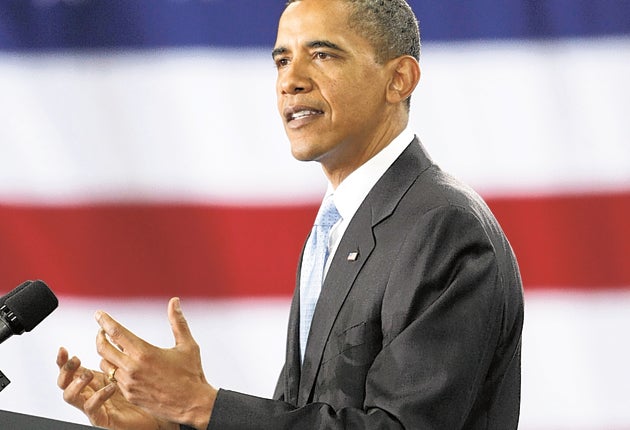BP plays its final card to stop leak: sludge
David Usborne reports from the Houston command centre masterminding efforts to prevent an ecological catastrophe

Your support helps us to tell the story
From reproductive rights to climate change to Big Tech, The Independent is on the ground when the story is developing. Whether it's investigating the financials of Elon Musk's pro-Trump PAC or producing our latest documentary, 'The A Word', which shines a light on the American women fighting for reproductive rights, we know how important it is to parse out the facts from the messaging.
At such a critical moment in US history, we need reporters on the ground. Your donation allows us to keep sending journalists to speak to both sides of the story.
The Independent is trusted by Americans across the entire political spectrum. And unlike many other quality news outlets, we choose not to lock Americans out of our reporting and analysis with paywalls. We believe quality journalism should be available to everyone, paid for by those who can afford it.
Your support makes all the difference.If there was near silence from BP's command centre on a low floor of a grey office building near Houston last night there were reasons for it. The stakes were too astronomic for anyone to speculate how the latest bid to tame the company's rogue well in the Gulf of Mexico was going until they really knew.
"It is one interesting day here," admits Bob Dudley, BP's Managing Director and board member, who ducks out for more than an hour to speak with The Independent. "Stephen Chu's in there," he notes. He means the US Energy Secretary. So is CEO Anthony Hayward. The company is about three hours into the long-awaited 'top kill', a bold effort to blast mud – more of a dense gel - into the well to clog it shut.
"So far we are proceeding to plan," is all Mr Hayward will venture when he also surfaces for a few moments, just in time for the main nightly news broadcasts on the American networks.
We may know more today. Or not. "It was always going to be between half a day and two days," before the result of top kill is known, says Dudley. That will be the moment when things suddenly seem a lot better for his image-tattered company and for the Gulf of Mexico or a lot worse. When I am taken to the command centre floor I am told to expect doors to be taped shut. Such is the sensitivity of the operation.
No one knows better than Dudley how grave this has become for BP, Britain's largest company. He and his colleagues are tackling the beast with "urgency but no emotion," he says. "To us this has to be very systematic." But President Barack Obama flies to Louisiana tomorrow and politics are all emotion. He is under pressure to take BP off the job completely, even if to do so might make very little sense.
This is why Dudley is speaking to a lone reporter even at so grave an hour. BP is defending itself against an array of charges that have become almost vicious: that its succession of gizmos to halt the gusher have seemed near-comical, that it has hidden from the public the true amounts of oil leaching into the ocean, that it has tried to shift blame and that it has underplayed the environmental threat.
"The idea that we have been making this up as we have gone along I think is not accurate," Dudley protests, armed with a sheaf of illustrations showing the armada of support ships, tankers, drilling rigs and robotic submersibles that have been deployed around the leak for weeks already. "I think we have been incredibly open about the operation and about everything we have been considering."
Maybe it's his way, but Dudley is calm and methodical in explaining the unfairness of the assaults on his company. As for the notion that a failure to stop the leak now might lead to its disintegration, he simply begs to differ, even if he knows the question might be considered legitimate by some. "It's a very strong financial company that has a strong cash flow," he says. BP, in other words, is still stinking rich.
That is a happy thing. BP has said it will pay all "legitimate claims" against it. Litigation will surely last a decade. So far it has spent $760 million responding to the crisis.
As for the issue of flow from the broken pipe, Dudley says that even now BP cannot put a certain figure on it. He talks of what happened in terms of "opening a soda can". As well as liquid, fizz comes out. Separating the gas from the oil in those plume pictures we see remains an imperfect science, he contends.
On the question of likely environmental damage, he knows to be careful because Hayward has been vilified for suggesting the damage might turn out to be "modest". But he does venture that it will be limited to Louisiana. "I think it's unlikely the oil will reach the coast of Florida," he offers, before adding hastily, "not that I mean to minimise it".
Minimising is on the minds of no one here. Everybody knows the top kill must work and hopefully be shown to do so before Mr Obama rides back into town. If he doesn't tell BP to get out of Dodge entirely – stop even trying to cap the well – he could chase them off the clean-up job and give it to the military. But one less burden for BP might not be so bad.
Join our commenting forum
Join thought-provoking conversations, follow other Independent readers and see their replies
Comments